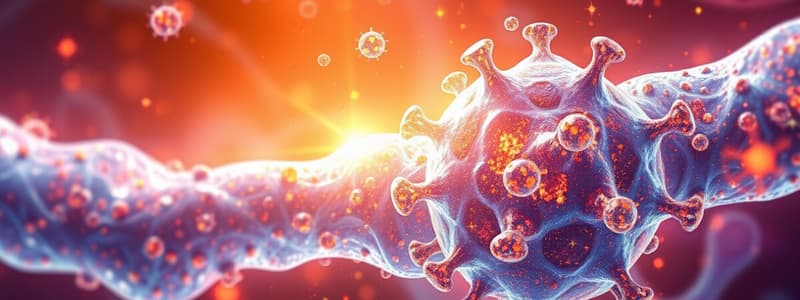Podcast
Questions and Answers
What is innate immunity?
What is innate immunity?
- Is nonspecific and present at birth. (correct)
- Provides increased susceptibility to disease.
- Is slower than adaptive immunity in responding to pathogens.
- Involves T cells and B cells.
Each of the following is an effect of complement activation EXCEPT:
Each of the following is an effect of complement activation EXCEPT:
- Opsonization.
- Increased phagocytic activity.
- Interference with viral replication. (correct)
- Bacterial cell lysis.
Which of the following is an effect of opsonization?
Which of the following is an effect of opsonization?
- Increased diapedesis of phagocytes.
- Cytolysis.
- Increased margination of phagocytes.
- Increased adherence of phagocytes to microorganisms. (correct)
The swelling associated with inflammation decreases when the fluid:
The swelling associated with inflammation decreases when the fluid:
Which of the following statements about fixed macrophages is FALSE?
Which of the following statements about fixed macrophages is FALSE?
All of the following protect the skin and mucous membranes from infection EXCEPT:
All of the following protect the skin and mucous membranes from infection EXCEPT:
All of the following are effects of histamine EXCEPT:
All of the following are effects of histamine EXCEPT:
A chill is a sign that:
A chill is a sign that:
Which of the following is mismatched?
Which of the following is mismatched?
The alternative pathway for complement activation is initiated by:
The alternative pathway for complement activation is initiated by:
The classical pathway for complement activation is initiated by:
The classical pathway for complement activation is initiated by:
The function of the 'ciliary escalator' is to:
The function of the 'ciliary escalator' is to:
Activation of C5-C9 results in:
Activation of C5-C9 results in:
Macrophages arise from which of the following?
Macrophages arise from which of the following?
Which of the following exhibits the highest phagocytic activity?
Which of the following exhibits the highest phagocytic activity?
A differential cell count is used to determine each of the following EXCEPT:
A differential cell count is used to determine each of the following EXCEPT:
The complement protein cascade is the same for the classical pathway, alternative pathway, and lectin pathway after the point in the cascade where the activation of ________ takes place.
The complement protein cascade is the same for the classical pathway, alternative pathway, and lectin pathway after the point in the cascade where the activation of ________ takes place.
All of the following increase blood vessel permeability EXCEPT:
All of the following increase blood vessel permeability EXCEPT:
Flashcards are hidden until you start studying
Study Notes
Innate Immunity
- Innate immunity is nonspecific and present at birth, providing immediate defense against pathogens.
- It is distinct from adaptive immunity, which involves T cells and B cells and has a memory component.
Complement Activation Effects
- Complement activation leads to increased phagocytic activity, opsonization, and bacterial cell lysis.
- It does not directly interfere with viral replication.
Opsonization
- Opsonization enhances adherence of phagocytes to microorganisms, facilitating their destruction.
- It does not primarily promote diapedesis or margination of phagocytes.
Inflammation and Swelling
- Inflammation leads to swelling, which reduces when fluid is directed into lymph capillaries.
- Macrophages play a role in clearing the site of infection.
Fixed Macrophages
- Fixed macrophages are found in specific tissues and organs, developing from monocytes, not neutrophils.
- They gather at sites of infection as part of the immune response.
Skin and Mucous Membrane Protection
- The skin and mucous membranes are protected from infection by multiple cellular layers, saliva, the ciliary escalator, and tears.
- Hydrochloric acid (HCl) does not serve as a protective barrier in this context.
Histamine Effects
- Histamine contributes to pain, vasodilation, swelling, and redness during inflammatory responses.
- It does not cause fever.
Body Temperature and Chills
- A chill signals that body temperature is rising, associated with increasing metabolic activity.
Misconceptions in Immunology
- Chemotaxis refers to the movement of immune cells towards chemical signals, not chemical degradation within phagocytes.
Interferons
- Alpha and beta interferons initiate the production of antiviral proteins and bind to uninfected cells, but their effects are not long-lasting.
Complement Pathways
- The alternative pathway for complement activation starts with lipid-carbohydrate complexes and C3.
- The classical pathway is initiated by antigen-antibody reactions.
C3 Activation Consequences
- Activation of C3 leads to acute inflammation, opsonization, and phagocyte attraction.
Ciliary Escalator Function
- The ciliary escalator traps inhaled dust and microorganisms in mucus and propels them away from the lower respiratory tract.
C5-C9 Activation
- Activation of C5-C9 results in the lysis of microbial cells within the immune response.
Macrophage Origin
- Macrophages arise from monocytes, which are a type of white blood cell.
Phagocytic Activity
- Macrophages exhibit the highest phagocytic activity among immune cells, surpassing neutrophils and others.
Differential Cell Count
- A differential cell count helps determine white blood cell types and conditions like leukopenia and leukocytosis but does not measure red blood cell counts.
Complement Protein Cascade
- The complement protein cascade converges at the activation of C3, unifying the classical, alternative, and lectin pathways.
Blood Vessel Permeability Factors
- Factors that increase blood vessel permeability include leukotrienes, prostaglandins, kinins, and histamine.
- Lysozymes do not contribute to increased permeability.
Studying That Suits You
Use AI to generate personalized quizzes and flashcards to suit your learning preferences.




